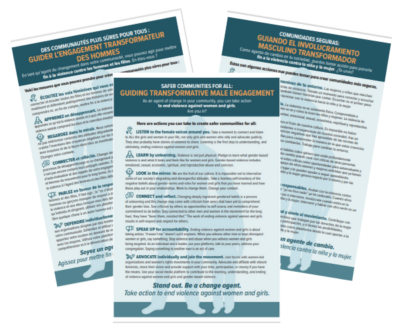Ensuring Access to Reproductive Health Services During the Pandemic

New guide from Roots of Health shares lessons from reaching 18,000 Filipina women during COVID-19
The COVID-19 pandemic is a “crisis with a woman’s face,” according to UNFPA, the United Nations Population Fund.
As schools, clinics, and businesses shut down to contain the spread of the virus, women and girls worldwide have become increasingly isolated from safe spaces and services. And their health has worsened, as governments have diverted resources away from maternal and reproductive health programs to deal with the ongoing pandemic.
The result? UNFPA reports an upsurge in gender-based violence, child marriage, and adolescent pregnancy, in every corner of the world.
Even before the pandemic, women and young people in the Philippines struggled to have their reproductive health needs met, according to Amina Evangelista Swanepoel, co-founder and executive director of WomenStrong partner Roots of Health.
“But the pandemic has made the situation even worse, with fewer services available,” added Ms. Swanepoel, who has led Roots of Health since 2009 to serve the women and girls on the island of Palawan.
With the virus still raging in the Philippines and vaccines hard to come by, women in most major cities and provinces remain under different levels of lockdown restrictions. And because government health workers have been mobilized to respond to COVID, those in remote areas and unable to access health facilities are forced to go without care.
That’s where Roots of Health has stepped in.
Based in Puerto Princesa, Palawan’s capital city, Roots of Health provides education and clinical reproductive health services to tens of thousands of women, men, and young people each year.
The organization was forced to shut its health clinic when COVID first struck. But as soon as it was safe to do so, Roots of Health staff quickly mobilized to take their services into communities, bringing contraceptives and family planning counseling to women’s doorsteps. They also shifted their education and outreach programs to online platforms such as Facebook.
“In 2020, despite COVID-19 disruptions, we provided over 18,000 women and girls access to contraception through our outreach work and clinics — 8.5% more than the previous year,” Ms. Swanepoel.
How were Roots of Health staff able to shift their services so quickly? Are there lessons they learned that can be applied by other service providers?
Roots of Health shares its lessons and recommendations in a new guide, Contraceptives & COVID-19: Ensuring Continued Access to Reproductive Health Services in the New Normal.
The guide, available to download free of charge, notes some of the pandemic-related challenges faced by service providers such as Roots of Health, from keeping their staff safe, to securing supplies, to the added financial burden of purchasing personal protective equipment. The pamphlet also shares what worked to help Roots of Health overcome these hurdles and ensure that girls and women in Palawan could access their services.

Within the Roots of Health guide are checklists and tips for how community-based service providers can:
- Obtain necessary clearances from local authorities;
- Enforce health and safety protocols for both staff and clients;
- Keep communication lines open;
- Ensure confidentiality; and
- Establish links and networks within the community.
The guide also includes an assessment tool with concrete suggestions for local government and other service providers to make services available to young people.
Contraceptives & COVID-19: Ensuring Continued Access to Reproductive Health Services in the New Normal guide was developed with support from WomenStrong International.
Roots of Health is one of WomenStrong’s 18 community-based grantee partners in 15 countries, all implementing projects in the areas of girls’ education, women’s health, and preventing violence against women and girls. WomenStrong partners also come together in a Learning Lab, where they share what’s working, and what’s not, in their efforts to improve the lives and wellbeing of women and girls.
“We are so pleased to partner with Roots of Health and to support this powerful non-profit in providing vital reproductive health access for the women and girls of Palawan,” says Dr. Susan M. Blaustein, WomenStrong’s executive director.
“And now with its new guide, other providers can learn from Roots of Health’s successes in reaching their target populations throughout this protracted crisis,” Dr. Blaustein says.
For more publications and resources produced within the WomenStrong Learning Lab, check out our resources section, on the WomenStrong International website.
To learn more about Roots of Health and the organization’s work, see www.rootsofhealth.org.



